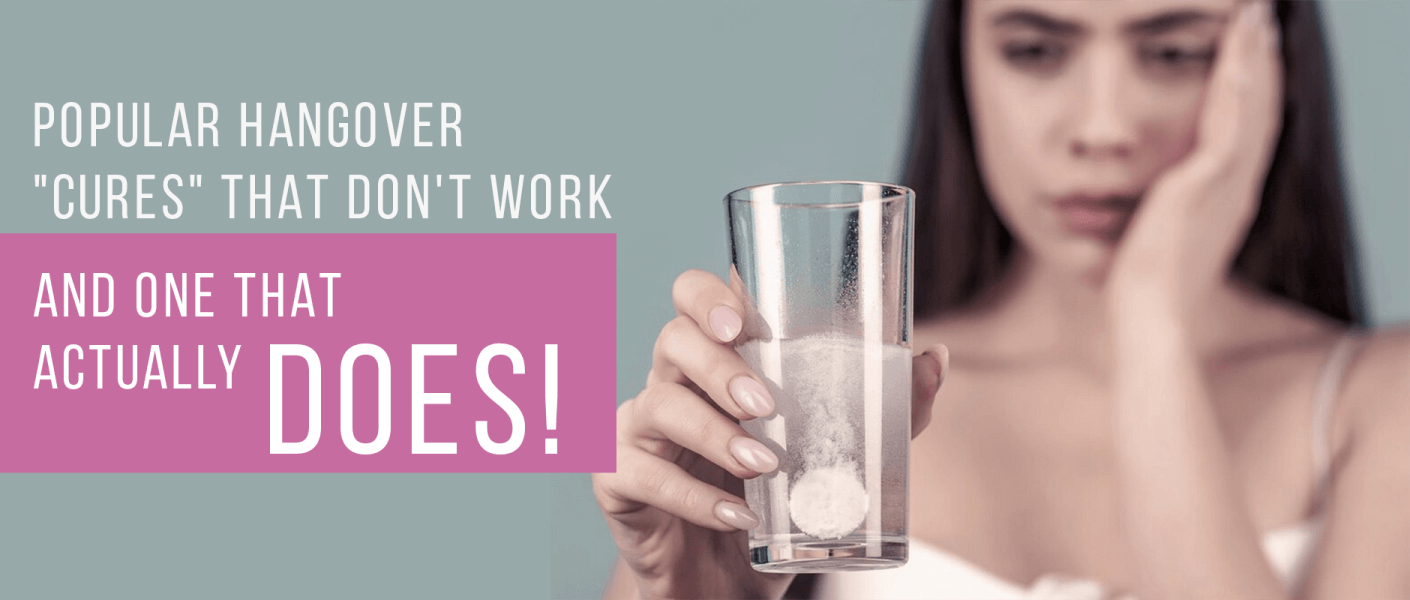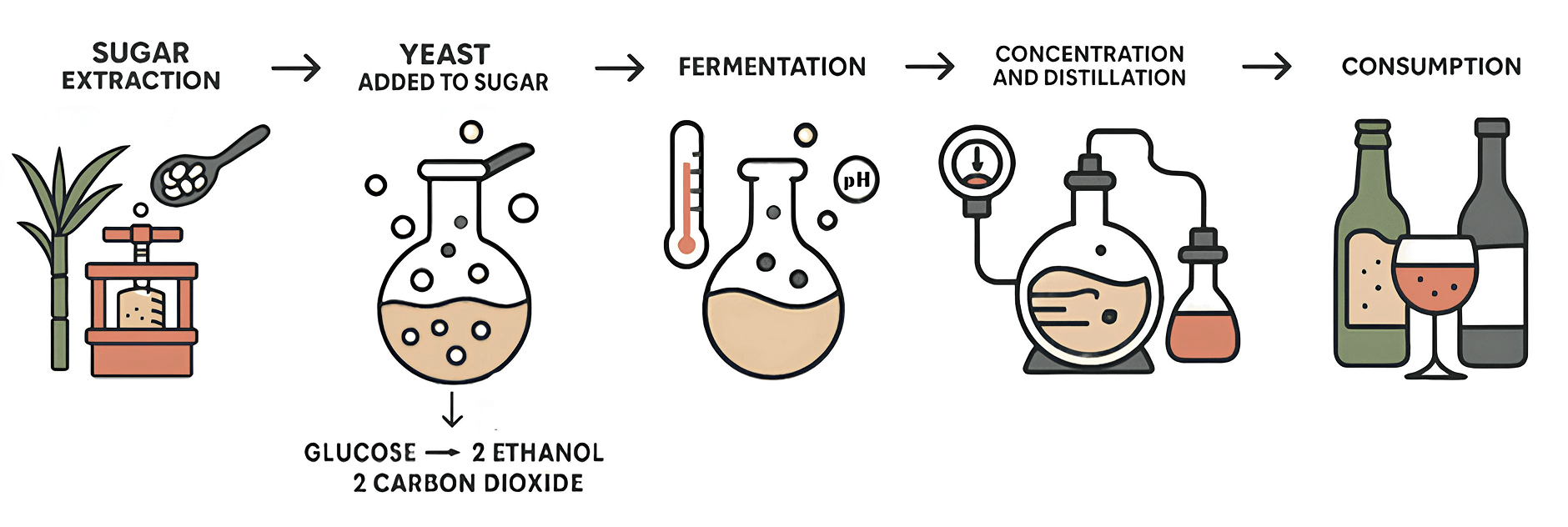
The use of alcohol for relaxation, socialization and ceremonial rituals dates back as far as human history, and we can safely assume that hangover symptoms have kept pace with alcohol use. Along the way, people have sought remedies to speed recovery from overindulgence and restore metabolic equilibrium. But popular remedies barely make a dent in alleviating hangover symptoms.
Fast-forward a few millennia, and science has finally concocted a natural remedy, delivered by IV infusion, that quickly eradicates hangover symptoms. Learn about hangover mechanisms, popular “cures” that don’t really help, and a remedy delivered by IV that actually works!
How are Alcoholic Beverages Produced?
Alcohol beverages are derived by fermenting sugars found in fruits, grains, honey, and even succulent plants like agave. Fermentation is an anaerobic process where yeasts or bacteria act on sugars to convert them to ethanol and carbon dioxide.
Here’s how it works:
- Sugar is extracted from the plant source, often by crushing or cooking.
- Active yeast is added to the sugar, breaking down the sugar molecules into pyruvate and feeding on it for energy.
- In the absence of oxygen, the yeast converts pyruvate into ethanol and carbon dioxide, forming alcohol – Glucose → 2 Ethanol + 2 Carbon Dioxide.
- The fermentation environment is optimized by keeping it at specific temperatures and pH. Fermentation time varies by alcohol type, taking from a few days to several weeks.
- Alcohol is naturally produced up to about 15% of volume – higher concentrations can kill the yeast. To achieve a higher concentration, hard liquors are further distilled.
- We consume alcohol in the form of ethanol. Carbon dioxide is responsible for the fizziness in beers and sparkling wines. Flavor is influenced by type of sugar, strain of yeast, and fermentation time.

In effect, fermentation is a series of chemical processes, refined over time, to give us a broad selection of alcoholic beverages to choose from. Factors that influence the severity of a hangover include percent of alcohol per volume, source of sugar, type of yeast, fermentation process, and total amount consumed.
What Causes a Hangover?
A hangover is your body’s reaction to ethanol toxicity, resulting in a cluster of symptoms that seriously impair your ability to function. Alcohol is primarily broken down by enzymes in the liver, where about 90% is converted to acetaldehyde, then into acetate, which is further converted into carbon dioxide and water. The remaining 10% is processed in the stomach and eliminated via breath, perspiration, and urine.
A hangover is triggered by multiple biological mechanisms:
- As a diuretic, alcohol increases urine production, causing a loss of fluids and electrolytes, and contributing to fatigue, headache and dry mouth.
- In the liver, alcohol is converted to acetaldehyde, a compound that your body recognizes as a toxin. When acetaldehyde accumulates faster than your body can process it, you experience nausea and headache.
- Reduced levels of electrolytes – sodium, potassium and magnesium – produce symptoms of irritability, muscle aches and weakness. Low electrolyte levels affect your heart and central nervous system function.
- Disruption to your GABA and glutamate systems causes the dysregulation of neurotransmitters, resulting in anxiety, irritability and sleep disturbance as the alcohol wears off.
- The release of pro-inflammatory cytokines causes systemic inflammation that contributes to fatigue, headache, and muscle aches.
- REM sleep is disrupted, resulting in fatigue and impaired cognition.
- Alcohol causes a drop in blood sugar, making you weak, shaky and moody.
- Congeners produced by dark liquors increase symptoms of nausea and headache.
At the end of the day, a hangover is really a reaction to poisoning, forcing your body’s systems into overdrive to restore metabolic equilibrium. Hangover symptoms taper off over time, and are typically resolved within 24 hours. Sleep and hydration can help, but your symptoms will remain until your system purges itself of the poison.
Common hangover symptoms include:
- General feeling of malaise
- Headache ranging from mild to severe
- General fatigue
- Upset stomach and nausea
- Dry mouth
- Irritable mood
- Inability to concentrate
- Reduced cognitive function
- Sensitivity to light
Popular Hangover “Cures” That Don’t Work
Most popular hangover cures are based on hearsay, without any scientific evidence to back them up. In some cases, the “cure” can actually make your symptoms worse, prolonging your recovery.
Popular hangover remedies that don’t work include:
- A hair of the dog that bit you – this entails drinking more alcohol, which may provide temporary relief by suppressing the nervous system, but it adds more poison to the mix, prolonging your recovery.
- Eating a greasy breakfast of fried foods, ostensibly to “soak up” the alcohol in your stomach. But by the time hangover symptoms set in, the alcohol has already been absorbed, and greasy food only upsets your stomach without providing much nutritional support.
- Drinking black coffee, the idea being to sober you up and make you feel less groggy. But coffee is a diuretic, and it can increase dehydration and loss of electrolytes, undermining your body’s efforts to regain equilibrium.
- Sweating it out through exercise or sauna. While it’s true that you eliminate some toxins through sweat, you also increase dehydration, intensifying fatigue and headaches.
- Staying in bed to “sleep it off” has its merits, giving your metabolism a break from other activities so it can reset, but sleep does not replenish fluids and electrolytes, and you may wake up with lingering symptoms.
- Taking a cold plunge or a cold shower. This may shock your system into alertness and have a sobering effect, but it won’t help you rehydrate or replenish lost electrolytes, and the effects of cold shock will quickly wear off.
- Taking NSAIDs like ibuprofen or aspirin before bed may temporarily suppress some symptoms, but NSAIDs can be hard on your stomach and liver, especially when mixed with alcohol, and their effects quickly wear off.
To get rid of hangover symptoms, you have to address the root causes, such as dehydration, electrolyte imbalance, and toxic byproducts like acetaldehyde. Rehydrating with electrolyte-enhanced water and eating mild but nutrient-dense foods like boiled eggs, yogurt and bananas, can provide your body with basic elements to help restore metabolic balance, but it will still take time to get rid of your symptoms.
Zap Hangover Symptoms with a Hangover IV Cocktail
Waking up with a hangover is the worst feeling ever, and popular remedies don’t do much good. In fact, eating a greasy breakfast or drinking a “hair of the dog” can upset your stomach and intensify your symptoms. A hangover typically self-resolves in 24 hours, and sleep can help if you have that luxury, but most people have responsibilities that cannot be postponed.
A hangover IV infusion delivers:
- Vitamin C to boost your immune function
- B-Complex vitamins, including B6 and B12, to promote recovery
- An electrolyte mix to support brain and nervous function
- Medications for nausea and headache
- A saline fluid solution, to eliminate dehydration
During a hangover IV session, you recline in a relaxing atmosphere as soothing ingredients are infused drip-by-drip. An IV session takes about an hour, giving you the perfect chance to doze off as your cocktail ingredients go to work. The ingredients are delivered directly to your bloodstream, bypassing your queasy stomach and accelerating their effects. Most people report significantly reduced symptoms by the end of their IV session.
Get Fast and Effective Hangover Relief in NYC
The most effective way to avoid a hangover is to abstain from drinking altogether, or to drink in moderation. But alcoholic beverages are ingrained into our social and cultural lives, and drinking suppresses your ability to self-regulate, causing you to drink to excess. By the time you become inebriated, it is impossible to reverse the toxic poisoning that sets you up for a hangover.
If you wake up with a hangover, don’t beat yourself up – a hangover should not be a punishment for having a good time. You can get fast relief and get your day back on track with a hangover IV cocktail from Invita Wellness NYC. Contact us today for more information, or pre-schedule a hangover IV for the morning after your next big event.
Get Fast and Effective Hangover Relief in NYC
contact InVita Wellness today
Book Now
456 Broadway 2 Floor, New York, NY 10013, USA
Resources
Razvodovsky, Y. “Hangover syndrome: Pathogenesis and treatment.” International Archives of Substance Abuse and Rehabilitation 3.1 (2021).
Hangover syndrome: Pathogenesis and treatment
Turner, Benedict RH, et al. “Inflammation, oxidative stress and gut microbiome perturbation: A narrative review of mechanisms and treatment of the alcohol hangover.” Alcohol: Clinical and Experimental Research 48.8 (2024): 1451-1465.
Inflammation, oxidative stress and gut microbiome perturbation: A narrative review of mechanisms and treatment of the alcohol hangover
Verster, Joris C., et al. “Alcohol hangover across the lifespan: Impact of sex and age.” Alcohol and alcoholism 56.5 (2021): 589-598.
Alcohol hangover across the lifespan: Impact of sex and age